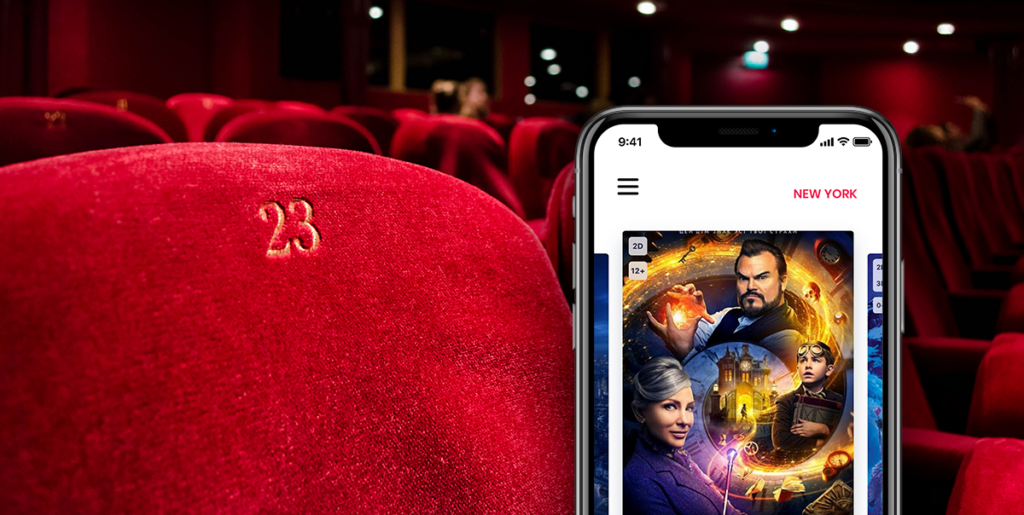Table of Contents
There’s a whole bunch of apps designed specifically for frequent moviegoers. They optimize and improve the whole process for both sides: cinemas and the audience. Apps that allow buying tickets have many other features onboard such as movie trailers, booking, loyalty programs, bonuses, discounts, etc. If you own a cinema, even a small one, you can definitely benefit from promoting it via AppStore or Google Play. Customers value their time and every minute spent in queues terrifies them. In the era where there’s even an app that shows you the best time to visit a restroom without missing something important in a movie’s plot (really, duh), a cinema ticketing app is a must for every respected cinema.
Functionality
The core functionality of every cinema app can be divided into 2 categories – ticket purchase and movie info. Although, before buying a ticket customers need to know showtimes and places to plan their schedule accordingly.
Movie Info
Cinema visitors decide whether or not to watch a film based on a set of criteria such as trailers, ratings, synopsis, actors, etc. Some may be in exclusively because Brad Pitt is on screen while others use resources like IMDB and Rotten Tomatoes to consult with reviews and ratings. You should definitely pack your app with these features. For starters, it’d be best to give IMDB rating and score from Tomatometer on RT with a couple of reviews, cast description, release date, etc.
Cinemas and Dates
Your app should also include the list of theaters. The more theaters you get, the better. It is reasonable to find partners here to make the app stand out and gain attention. It is also more flexible and gives a variety of choice to a bigger client base. Keep in mind that sometimes moviegoers pick a date and sometimes they pick a particular theater. More theaters means more dates which means more movies for a bigger amount of clients. It’d be best if you integrated geolocation to show clients the nearest theaters.
Ticket Purchase
Once the choice is made, customers would like to buy a ticket. For this, your app should have a payment gateway. It is important to shorten customer journey and make the purchase as fast and smooth as possible without visitors changing their mind in the process. Accepting credit or debit cards only is no longer an option. Consider adding Square, Stripe or Paypal payment gateways as well as Apple Pay and Google Pay. And maybe soon enough we’re all going to pay with Libras, even, right? Nevermind. Apple Pay and Google Pay will do for now.
Popular Choices
There are many movie apps already out there. But the appearance of Uber didn’t stop the market from expanding, on the contrary, it made possible for Lyft and a bunch of other similar on-demand services to exist. The demand is one the rise with more people watching more films. Logically, this demand should be met with more buying options. Give the customers improved apps or target them locally outside the sphere of influence of huge cinema chains. Nevertheless, here are some of the most successful cinema apps up to date to look up to.
Fandango Movies
It is perhaps the most widespread cinema app out there. It uses geolocation to find movies nearby and let’s users buy a ticket directly from the app. It is not limited by movies and can also suggest theaters or concerts going on near a user’s location.
MovieTickets.com
This app allows buying a ticket for any theater and also watch a trailer for a movie of interest. It is not tied to any particular cinema chain and uses extensive database that is updated regularly to provide you with the list of cinemas operating in your area.
Emagine Theatres
Emagine is a movie theater chain and their app definitely helped them to expand its business. This is a good example of the app that improves brand awareness. Many choose Emagine because it allows users to do literally everything via the app and it also was one of the first to introduce such solution on the market.
Movies by Flixster
Flixster allows buying movie tickets at the nearby theaters. It uses geolocation and it is not tied to any particular cinema chain. With Flixster it is also possible to watch trailers, see reviews, ratings, and even comments by other users.
Benefits
If you don’t own a cinema, you can be a software provider for the existing cinemas. This way you’re going to earn using a SaaS (software as a service) model. But, of course, the real benefits of a cinema ticketing app appear in the form of increased sales and not monetization per se. A cinema ticketing app makes possible to gather more precise user metrics and customer data. So it’s a great way forward if you already own a cinema or plan to open one. Here’s a detailed list of things that go along with having your own cinema ticketing app.
- Shorter customer journey cycle
- Increased client satisfaction rate
- Data collection and user metrics with advanced analytics
- Advertising your cinema theater in App Store and Google Play
- Market research (who sees what, when, and where)
- Competitive advantage (most cinemas already use it)
- Filled theaters and less queues
These are far from all advantages of automating your sales process. Introducing the app, you reduce time it takes for the viewers to find your cinema because with a clever promotion, your cinema will always be in the hands and pockets of your target audience. The story of Moviepass greatly illustrates the demand for movie-going apps and though the company’s strategy of “divide and conquer” did not play well for it, it indicates the possibilities that exist in the niche.
FAQ
Conclusion
Developing your own movie ticketing app can coincide with the opening of your cinema if you plan one. It will contribute well for a kind of “blitzkrieg” promotion of your business. Keep in mind that even small movie clubs and cinema ventures benefit a lot from social media accounts on Facebook and Instagram. You probably already have those, so it is now time to go fully digital and make your own cinema ticketing app.






